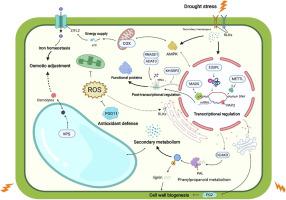Journal of Advanced Research ( IF 10.7 ) Pub Date : 2022-09-25 , DOI: 10.1016/j.jare.2022.09.008 Cheng-Wei Qiu 1 , Yue Ma 2 , Wenxing Liu 3 , Shuo Zhang 1 , Yizhou Wang 2 , Shengguan Cai 2 , Guoping Zhang 2 , Caspar C C Chater 4 , Zhong-Hua Chen 5 , Feibo Wu 2

|
Introduction
Frequent climate change-induced drought events are detrimental environmental stresses affecting global crop production and ecosystem health. Several efforts have facilitated crop breeding for resilient varieties to counteract stress. However, progress is hampered due to the complexity of drought tolerance; a greater variety of novel genes are required across varying environments. Tibetan annual wild barley is a unique and precious germplasm that is well adapted to abiotic stress and can provide elite genes for crop improvement in drought tolerance.
Objectives
To identify the genetic basis and unique mechanisms for drought tolerance in Tibetan wild barley.
Methods
Whole genome resequencing and comparative RNA-seq approaches were performed to identify candidate genes associated with drought tolerance via investigating the genetic diversity and transcriptional variation between cultivated and Tibetan wild barley. Bioinformatics, population genetics, and gene silencing were conducted to obtain insights into ecological adaptation in barley and functions of key genes.
Results
Over 20 million genetic variants and a total of 15,361 significantly affected genes were identified in our dataset. Combined genomic, transcriptomic, evolutionary, and experimental analyses revealed 26 water deficit resilience-associated genes in the drought-tolerant wild barley XZ5 with unique genetic variants and expression patterns. Functional prediction revealed Tibetan wild barley employs effective regulators to activate various responsive pathways with novel genes, such as Zinc-Induced Facilitator-Like 2 (HvZIFL2) and Peroxidase 11 (HvPOD11), to adapt to water deficit conditions. Gene silencing and drought tolerance evaluation in a natural barley population demonstrated that HvZIFL2 and HvPOD11 positively regulate drought tolerance in barley.
Conclusion
Our findings reveal functional genes that have been selected across barley’s complex history of domestication to thrive in water deficit environments. This will be useful for molecular breeding and provide new insights into drought-tolerance mechanisms in wild relatives of major cereal crops.


























 京公网安备 11010802027423号
京公网安备 11010802027423号